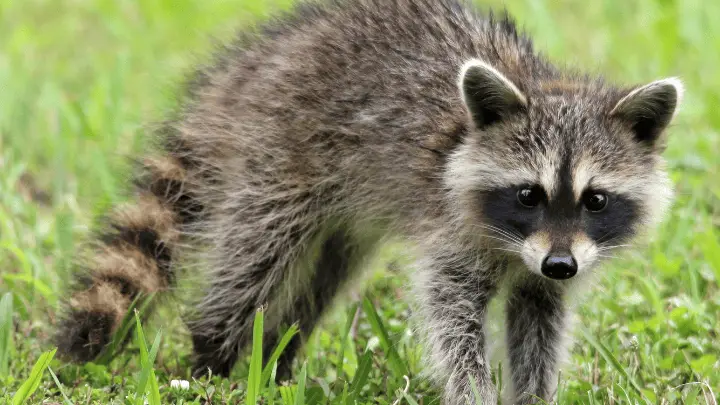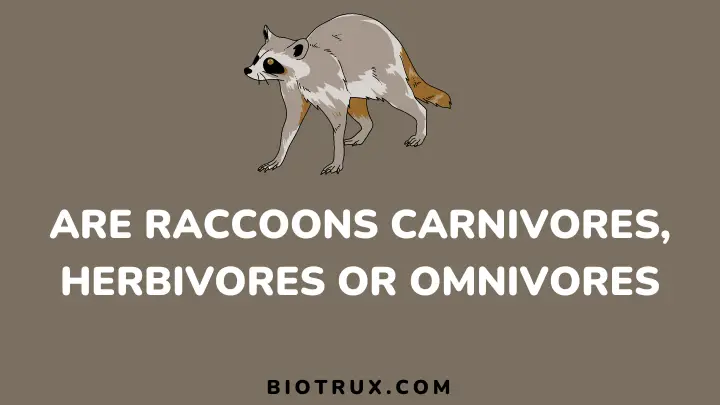Raccoons, with their mischievous eyes and ringed tails, are a familiar sight in many parts of the world. But have you ever stopped to wonder what these nocturnal creatures eat? Are raccoons carnivores, herbivores, or omnivores?
In this article, I’ll unravel the mystery of the raccoon diet. I’ll dive deep into their eating habits, exploring if raccoons are carnivores, herbivores, or omnivores.
Here’s a fascinating fact to whet your appetite: Raccoons have highly sensitive front paws, which they use to ‘feel’ their food, a behavior known as ‘dousing.’ This is just one of the many intriguing aspects of raccoon dietary habits that you’ll discover in this article.
So, buckle up and join me on this exciting culinary journey into the world of raccoons. By the end, you’ll have a newfound appreciation for these adaptable and resilient creatures.
Carnivorous Tendencies: What Do Raccoons Hunt?
Raccoons, known scientifically as Procyon lotor, are often seen as cute and mischievous creatures. However, beneath their adorable exterior lies a skilled and opportunistic predator. Let’s delve into the predatory tendencies of raccoons, their hunting techniques, and prey preferences.
Instances of predatory behavior
Raccoons are omnivores, meaning they eat both plants and animals. While they are known to rummage through trash cans in urban areas, in the wild, they display distinct predatory behavior.
They are primarily nocturnal hunters, using the cover of darkness to stalk and capture their prey. Raccoons have been observed hunting in groups, especially when the prey is larger or more challenging to catch.
Hunting techniques and prey preferences
Raccoons employ a variety of hunting techniques, often dictated by the type of prey and the environment. They are excellent climbers and swimmers, which allows them to access a diverse range of habitats and food sources.
One of their most distinctive hunting techniques involves the use of their highly sensitive front paws. Raccoons have a heightened sense of touch, which they use to locate potential prey in murky waters or dark environments.
This behavior, known as ‘dousing,’ involves the raccoon dipping its paws into water to feel for potential food items. Raccoons are opportunistic hunters, meaning they will eat whatever is readily available and easy to catch.
Their diet varies depending on the season and location. However, they show a preference for certain types of prey.
Typical prey items for Raccoons
In aquatic environments, raccoons hunt for a variety of organisms. They are fond of crayfish, frogs, fish, and other aquatic invertebrates. On land, they hunt rodents, insects, and bird eggs. They are also known to eat fruits, nuts, and vegetables, particularly when animal prey is scarce.
In conclusion, while raccoons may appear cute and harmless, they are skilled predators with a diverse diet. Their opportunistic nature, combined with their unique hunting techniques, makes them fascinating creatures to study.
Herbivorous Inclinations: Do Raccoons Consume Plants?
Let’s explore the herbivorous side of raccoons, describing the types of vegetation they consume and discussing any seasonal variations in their herbivorous habits.
Evidence of herbivorous tendencies
Raccoons have a diverse diet that includes a significant amount of plant matter. This is evident from the analysis of their scat, which often contains remnants of fruits, nuts, and other plant materials. Additionally, observations of raccoons in both urban and wild settings have shown them consuming a variety of plant-based foods.
Types of vegetation consumed
Raccoons are not picky eaters and will consume a wide range of plant matter. This includes fruits such as berries, apples, and peaches, which they often find in residential areas.
In the wild, they consume acorns, nuts, and seeds. They also eat corn and are known to cause significant damage to cornfields. Raccoons also consume a variety of other plant materials, including leaves, stems, and roots.
They have been observed digging in the ground for grubs and worms, during which they may also consume root vegetables like carrots and potatoes.
Seasonal variations in herbivorous habits
The herbivorous habits of raccoons vary with the seasons. In the spring and early summer, they consume a lot of fruits and berries as these foods are readily available. In the fall, their diet shifts towards nuts and acorns, which provide the necessary fats and energy for the winter.
During the winter, when food is scarce, raccoons may rely more heavily on plant matter. They are known to raid winter caches of other animals, consuming stored nuts and seeds. In urban areas, they may rely on human-provided food sources, including fruits and vegetables in compost bins.
In conclusion, while raccoons are skilled predators, they also have significant herbivorous tendencies. Their diverse and adaptable diet allows them to thrive in a wide range of environments, from dense forests to urban neighborhoods.
Omnivorous Nature: The Balancing Act
Let’s learn about what raccoons like to eat. They’re called omnivores because they eat both plants and animals. Eating both is really helpful for raccoons because they can find food in lots of different places.
The omnivorous diet of raccoons and its significance
Raccoons are omnivores, meaning they consume a wide variety of foods, including both plants and animals. This dietary flexibility is a key factor in their ability to thrive in diverse habitats, from rural forests to urban cities.
Their diet includes fruits, nuts, insects, rodents, fish, and even human garbage when available. The significance of this omnivorous diet lies in its adaptability.
Raccoons can adjust their diet based on the availability of food sources in their environment. This adaptability allows them to survive in a wide range of habitats and climates.
Advantages of being an omnivore
Being an omnivore comes with several survival advantages. Firstly, having a varied diet means raccoons can take advantage of a wide range of food sources. This reduces competition for food and allows them to inhabit diverse environments.
Secondly, an omnivorous diet provides a balanced intake of different nutrients. Raccoons can get proteins from animal sources and essential vitamins and minerals from plant sources. This balance contributes to their overall health and survival.
Finally, being an omnivore allows raccoons to adapt to changing food availability throughout the year. They can switch from eating fruits and nuts in the summer and fall to hunting small animals in the winter when plant foods are scarce.
The varied diet of raccoons and its ecological impact
Raccoons play a crucial role in their ecosystems due to their varied diet. By consuming a wide range of foods, they help control the population of many species, from insects to small rodents.
Their preference for fruits and nuts also makes them effective seed dispersers, contributing to the propagation of many plant species. However, their omnivorous nature can also lead to conflicts with humans, especially in urban areas where they can become pests.
In conclusion, the omnivorous nature of raccoons is a testament to their adaptability and resilience. It allows them to thrive in diverse environments and plays a crucial role in maintaining ecological balance.

FAQs
What do raccoons primarily eat?
Raccoons are opportunistic feeders, consuming a varied diet consisting of fruits, nuts, insects, small mammals, birds, eggs, and even human food scraps.
Can raccoons survive solely on meat?
While raccoons do consume meat, they require a balanced diet comprising both plant and animal matter to thrive.
Do raccoons pose a threat to livestock?
Raccoons may target poultry and small livestock, posing a threat to farm animals. Securing food sources and employing deterrents can help mitigate conflicts.
Are raccoons beneficial to ecosystems?
Yes, raccoons play crucial roles in ecosystem health by controlling insect populations, dispersing seeds, and scavenging carrion.
How do raccoons adapt to urban environments?
Raccoons exhibit remarkable adaptability, thriving in urban landscapes by capitalizing on food resources such as garbage bins and pet food.
Are raccoons considered pests?
While raccoons’ scavenging behaviors can lead to conflicts with humans, they are integral components of natural ecosystems and warrant coexistence strategies.
Final Verdict: Are Raccoons Carnivores, Herbivores or Omnivores?
After a detailed exploration of the dietary habits of raccoons, it’s clear that these creatures are omnivores. Their diet is incredibly diverse, encompassing a wide range of both animal and plant matter.
Raccoons display significant carnivorous tendencies, hunting a variety of prey with skill and adaptability. They consume insects, fish, rodents, and even human garbage when available, demonstrating their opportunistic nature.
However, they also exhibit herbivorous inclinations, consuming fruits, nuts, seeds, and other plant materials. This aspect of their diet provides essential vitamins and minerals, balancing out the proteins obtained from animal sources.
The omnivorous nature of raccoons is a testament to their adaptability and resilience. It allows them to thrive in diverse environments, from dense forests to urban neighborhoods and plays a crucial role in their survival and ecological impact.
In conclusion, raccoons are neither strictly carnivores nor herbivores; they are omnivores, skillfully balancing a diet of both meat and plant matter to survive and thrive in their ever-changing environments. Their dietary habits offer fascinating insights into their behavior, adaptability, and ecological role.
You can also learn more about whether Whales follow a traffic pattern in the ocean.
Thanks for reading.
